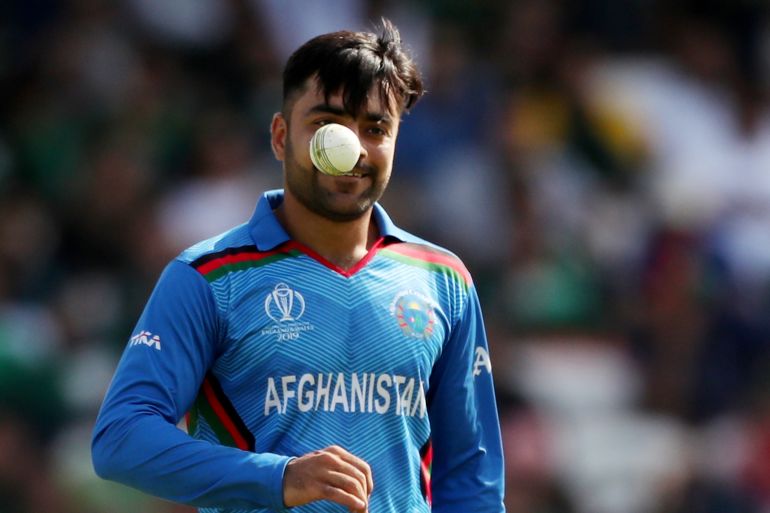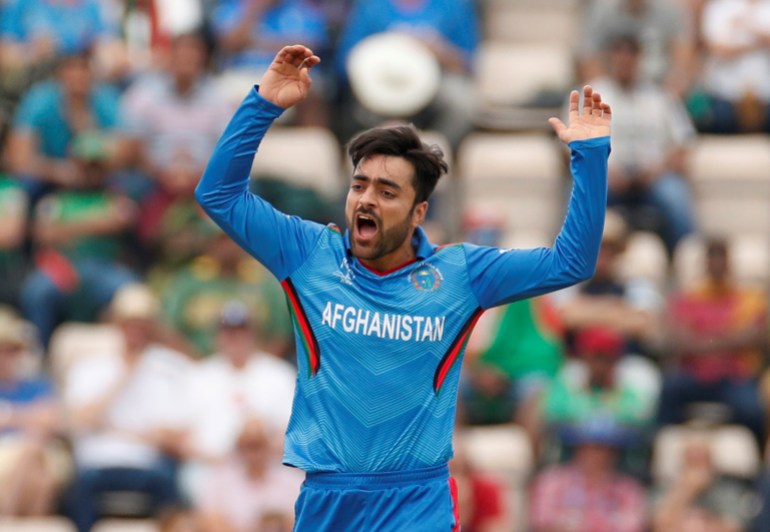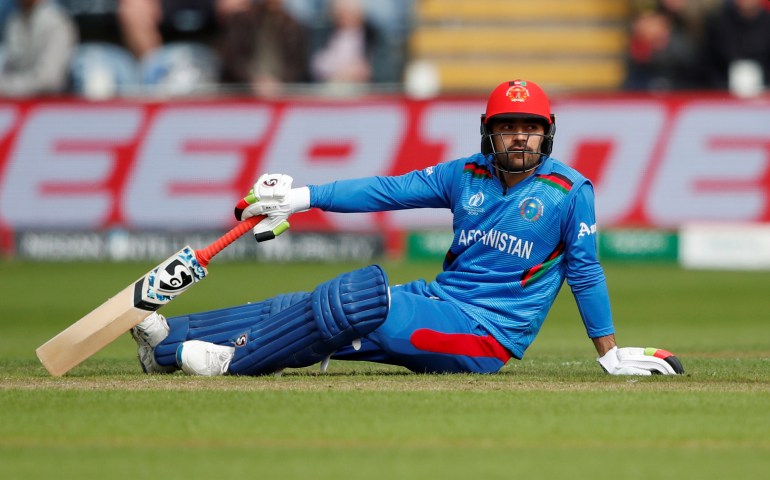The life and career of Rashid Khan, Afghanistan’s cricket prodigy
How Rashid moved from outclassing his brothers on a cement track to being named Player of the Decade.

The life and career of Afghanistan cricketer Rashid Khan has seen the theatrical treatment: The curtains parted one day and there he was.
Among a cast of romantic, colourful cricketers from the country’s fairy tale, stood the teen prodigy, the one player ready-made for the biggest stage.
Keep reading
list of 3 items‘Mental torture’: Pakistan’s Amir quits international cricket
Born out of conflict: How cricket is helping heal Rwanda’s wounds
Online profiles feature Rashid’s One-Day International (ODI) debut at the age of 17, the 25 teams he has represented in various formats, his admiration for Pakistan’s Shahid Afridi, that whippy, whirly action, dead-eye wrong ’un, striking ability with the bat, athleticism in the field and the ICC T20 Player of the Decade title, even though he played in only half of it.
But what about the other parts of the man that was known as Rashid Arman, the sixth of 11 brothers? The dreamer who thought he would become the family’s first doctor? The computer science student with beautiful handwriting? The part-time English teacher? The boy who was called “Peshawari” in Afghanistan’s local cricket and “muhajir” (refugee) during his college days in Peshawar, Pakistan?
There are bits that make up his life from Bati Kot to Peshawar and back to Afghanistan’s Jalalabad then Kabul, before his October 2015 ODI debut in Bulawayo – on his way to becoming Rashid Khan, the superstar.
In the life of every cricketer, there are family, coaches and teammates who watch their rise with a mix of emotions: Love, pride, delight, among lashings of envy.
We begin with a story from Inzamam-ul-Haq, the former Pakistan captain who was Afghanistan coach from October 2015 to April 2016.
Looking at a list of his squad for a 2016 tour of Sharjah, Haq noted Rashid’s omission.
While Rashid’s performance in Bulawayo had not been earth-shattering, he – out of the roster of leg-spinners Haq had first called out and tried – had impressed.
So much so that Haq ended the arguments with selectors by saying: “Only after Rashid is in the team can you talk to me about other things.”
Six years later, Rashid’s name is first on every Afghanistan team sheet.
These days, Rashid is in Abu Dhabi for the Test series against Zimbabwe.
In the touring party is senior team manager Nazeem Jar Abdulrahimzai, who, in his many past roles in Afghanistan cricket remembers 2012 as the year he first met Rashid.
At a provincial Twenty20 match in Kabul, playing for a club called Kochian, Abdulrahimzai watched an unknown teenager, of small built, batting like a dervish.
“He was opening, he scored 93. When he bowled, no one could read him. It hit the legs, bowled. It hit the pads, LBW. It’s like they couldn’t see,” said Abdulrahimzai. “I had not seen a boy like that.”
Rashid had been spotted, marked for attention and encouragement.
Abdulrahimzai started emailing regional teams, asking them to try Rashid out, pushing those who hesitated.
“Listen, I’m the domestic manager, you take him, give him training and a trial. If you’re happy with him, fine. If you’re not, he can come back.”

In 2013, Afghanistan set up the Shpageeza Cricket League, which was to become its national T20 competition, one of the many steps Rashid would take on his meandering odyssey.
That year, at Peshawar’s Arbab Niaz Stadium, Islamia College Coach Ali Hoti was approached by a teenager who introduced himself as Rashid Arman and said he wanted to join the college and its famous cricket programme.
Islamia College alumni have represented Pakistan in various sports. Among its celebrated cricketers are Haseeb Ehsan, Yasir Hamid, Wajahatullah Wasti and Shaheen Shah Afridi.
When Hoti and team captain Sajjad Hashmi saw the youngster’s clean-hitting with the bat and his unorthodoxy with the ball, they knew they had spotted a winner.
But at the trials for the university’s sports quota admissions, the young man was missing. He had had to dash over to Afghanistan to play in a tournament.
This to and fro was due to Rashid’s nomadic boyhood, often as part of a business family alongside 10 brothers.
Cricket, the constant
During a period of uncertainty and war, as the family moved between towns on the border, cricket remained the only constant.
Rashid’s skills were homemade, on the concrete strip inside the housing compound meant for parking cars, in taped tennis ball contests with his brothers, especially brother number two, a football fan.
Once, so furious at being done in by Rashid, his brother wrapped extra tape on the tennis ball only for Rashid to get past him again.
The brothers were competitive but protective. Abdulrahimzai remembers one of Rashid’s brothers Jalil, sitting next to him during an early under-19 match, asking: “What will become of this boy? Of Rashid?”
If he had asked Rashid, he would have been shown him the road map.
At Islamia, Hoti said Rashid enrolled for a computer science degree from 2013 and the formalised structure of cricket training and competition.
Team captain Hashmi befriended the quiet, new entrant and saw what Abdulrahimzai had seen: Presence and confidence.
Hashmi, a former opener-wicketkeeper who played domestic cricket in Pakistan, said Rashid immersed himself in cricket, barely spoke and never complained.
“As college captain, players come and argue their case: Why did you bowl me so late, why can’t I bat in this position. With Rashid, nothing,” said Hashmi.
On one occasion, Rashid was dropped due to a dispute in the team and Hashmi went to his home to make peace.
“The next time I went to the ground, he was there. With his cones, doing his training and shuttle runs,” said Hashmi.
“Others might have gone into a sulk, but he knew what he had to do and wasn’t going to stop. Rashid didn’t waste time, he was driven and completely focused. It was like inside, his real talents were hidden, waiting for their time.”

Within three years, the world would see those talents.
We must turn to Abdulrahimzai’s Urdu to understand what Rashid’s on-field manner reflected: “Haawi rehna” (domination) and what Abdulrahimzai never saw in him: “Bebasi” (helplessness).
In collegiate and inter-university cricket, Hashmi said Rashid earned the reputation of being the spinner all batsmen thought best to see off.
Hoti is now director of sports at what is now Islamia University and recalls Rashid’s “zabardast” [amazing] handwriting and the pressure from home to study.
“Rashid was a good student, a thinker. He would try to speak in English, practice it every day, along with his Pashto and Urdu.”
Rashid once said in an interview that he taught English for about six months before cricket took over as he prepared himself for a life beyond college and the towns he called home.
The variations
Rashid’s first cricketing schools – the restrictive and demanding surface of the concrete corridors in his family’s many homes – gave him the fast-arm action to get extra zip on the taped tennis ball.
Flipping the ball out off his fingers – who said wrist-spinners must only use their wrists? – he sent it whirring through the air, rushing the batsmen on concrete, matting, turf, anything.
Where conventional spinners use variations of pace, loop and flight to judge what works best where, Khan’s pace – more than 90km/h (56mph) – is his fundamental staple.
He said he has five grips to choose from during a game… and three googlies.
“Shahid Afridi was my role model while growing up in Afghanistan”. (Rashid Khan)
Inspiration of many.❤️@SAfridiOfficial Thank you Lala.#BoomBoom pic.twitter.com/31Y1pyvuwA— Zain Zahid (@ZainZahid____10) March 9, 2021
To most batsmen, the range is not the issue. Rather, it is the sameness of what everything looks like that leads to befuddlement over what is going to arrive.
As Haq described it, the batsmen’s lack “response time” to react to a ball that not only turns, but turns at speed.
It was not those skills alone that marked Rashid in Haq’s eyes.
On his debut tour in Zimbabwe, Rashid sat out the first ODI. Before the second, Haq told him to bowl at him in the nets.
“If I’m out, you’re in,” he said.
Rashid failed to dismiss his coach but remembers beating him once.
“Even if I had got out to him, it would’ve been fine, that’s the quality of bowler he is. I would have played him, but I wanted to see how he would respond,” Haq said.
What happened before their exchange had revealed more to Rashid.
“When I challenged Rashid, the 17-year-old looked me in the eyes and said ‘haanji, theek hai, aayein net main’ [sure, that’s fine. Come to the nets],” said Haq with a chuckle.
Rashid’s game was always going to be on.